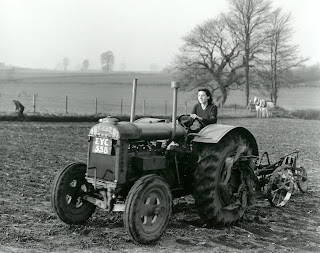A Corner of the Vineyard
By Denise Johannsen
The Saints at War
The time was around 6 p.m., the day, September 15, 1939. Families sat around the wireless, waiting apprehensively for the statement which was promised the night before by the Prime Minister of Great Britain, Nevil Chamberlain. Suddenly his voice came through the air waves! He spoke slowly and solemnly, proceeding to inform the listeners that Great Britain was now at war with Germany. An overwhelming feeling of fear and gloom entered the hearts of the population as they tried to digest what they had just heard. Mothers and wives, sensing the inevitable that their men folk would have to leave for foreign, and now hostile, shores, to fight a battle for human rights and freedom. Some they knew would never return.
The war brought full time employment, with factories working day and night to meet the demand. Many more women came into industry, as the men went off to fight. The skilled men were not allowed to join the forces, because they could not be spared. Their expertise was needed at home. Blackburn mills were producing parachutes, uniforms, medical supplies, ie. bandages, etc. The foundries were making parts for aeroplanes. The Royal Ordinance Factory at Guide, were making ammunition. In fact, they still do up until this present moment in time. Then there was the Women's Land Army. These spirited, gutsy, young women went to help on the farms, as obviously they were short of manpower too.
There was money to spend, but alas very little to spend it on. They were at last in the position to buy a few luxury food items, but fate had dealt them another blow. Owing to the sinking of supply ships by the Germans, there was a shortage of food. So everything was on ration; you were allowed, for instance, 2 oz. of butter per person per week. They simply just could not win.
Five gruelling years of World War II followed. There was great relief, and much rejoicing on E. E. day (victory in Europe day) May 8, 1845, when the armistice was signed and the war was officially over. Now they could work towards a brighter future. Hundreds and thousands of men had been killed in the war, which inequitably left the country short of manpower. The government had the brilliant idea of encourage men and women, mainly from war torn Italy, to work in the factories. Enticed by the promise of free passage, good wages, (they were paid, in general, more than the average British worker), plus three years tax free. Needless to say, they left their homelands in the thousands, hoping, and receiving a better life.
Huge council estates were under construction. Blackburn had not suffered much devastation through the bombing, unlike some cities such as London, Birmingham, and Coventry. Nevertheless, they had numerous housing schemes in the pipe line, promising electricity, bathrooms and garden. Most terraced houses still did not have these facilities, but by the end of the forties, almost every home had electricity.
 |
| Typical terraced houses in 1940s-1950s--and now ( : |
At the outbreak of the war, the missionaries serving in Blackburn, British Isles, and Europe, were called home. Many were to return as servicemen, so the saints were left alone. They must have felt a little vulnerable without the physical support of their brothers and sisters in Utah, even though their prayers must have been a comfort to them. Although, standing firmly, united in their faith, and in their purpose, with the rest of the saints in the area, they continued to hold conference, conducing their affairs as best they could. There were very few members still.
1947, by now the missionaries returned, also young men who had fought for their country.






No comments:
Post a Comment